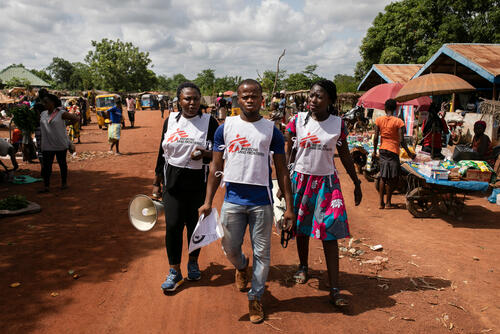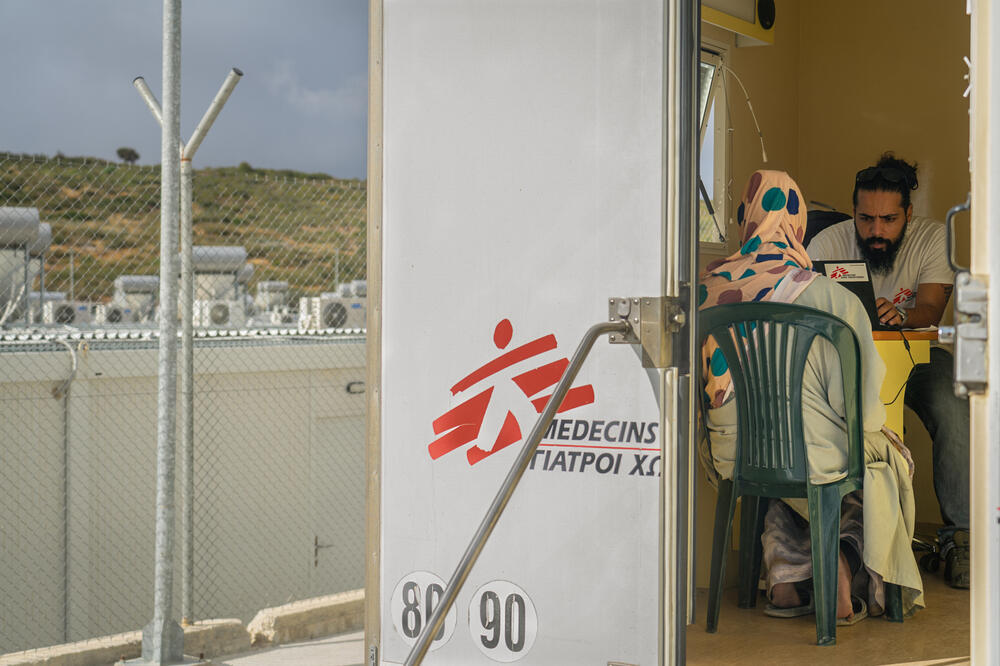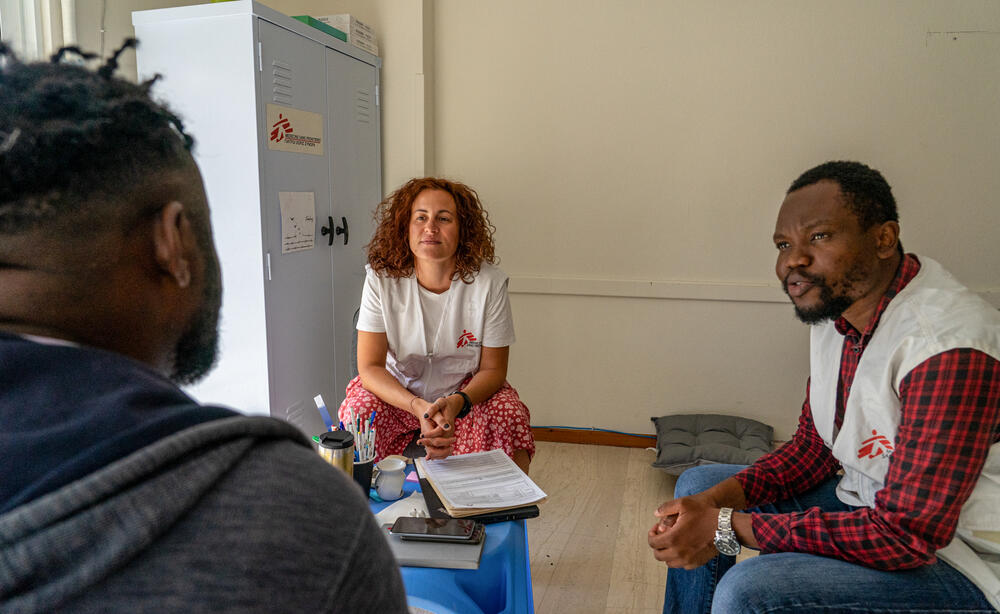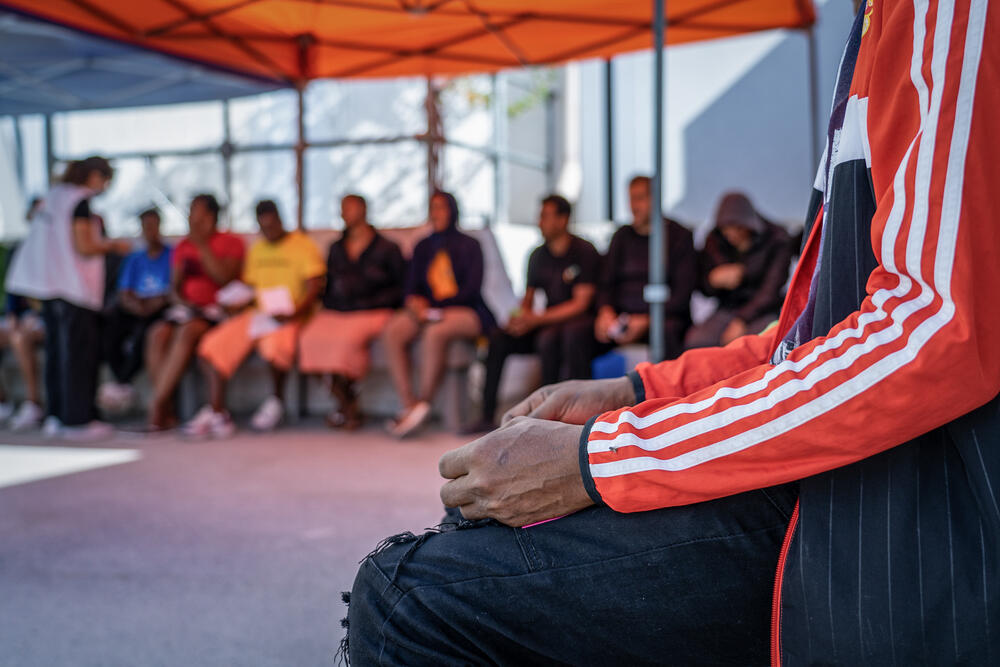Closed centres on Greek Islands: "Everyone is suffering from psychological distress"
Trying to see a doctor; getting hold of insulin treatment for diabetes; seeking legal advice prior to an asylum interview. All of these are a challenge for the refugees, migrants and asylum-seekers stuck in the isolated and highly securitised Zervou centre on the Greek island of Samos.
Zervou centre is the result of an aggressive EU-funded containment policy to open ‘closed-controlled access centres’ in remote locations on five Aegean islands, where people seeking safety in Greece are placed while their asylum claim is being processed. Three of these centres opened on Samos, Leros and Kos, with a further two planned to open in 2023 on Lesvos and Chios.
People arrive in Greece distressed, most having fled conflict or persecution in their home countries, and many having been exposed to appalling levels of violence during their journeys. They are welcomed with double layers of barbed-wire fencing, X-rays and biometric identification.
“People in Zervou centre tell us of having survived trafficking, sexual assault, forced labour and beatings”, says MSF country representative Nicholas Papachrysostomou.
“Some have seen their family members die during previous forced returns or during shipwrecks. The prison-like centres fail to provide for their basic needs and cause preventable harm to their mental and physical health.”
Only people with an asylum ID card can enter or leave Zervou centre but registering for an ID card can take 25 days or longer. All new arrivals are therefore effectively detained, without the freedom to come and go. So far, the centre’s management has allowed people without ID cards out for medical or legal appointments, but this could change at any moment.
Failure to provide adequate healthcare
“The first glaring gap is people’s lack of access to healthcare,” says Sonia Balleron, MSF project coordinator in Samos. “You have to imagine people who have been traveling for quite some time without medical care.”
Yet since February 2022 doctors have only visited the centre on occasional days for a few hours at a time. The healthcare provision within centres continues to be problematic with a continuous lack of medical staff and medical supplies.

In response to this situation, and to ensure that people’s basic health needs are met, MSF has been running a mobile clinic three times per week since April 2022 in Zervou centre.
"Everyone is suffering from a basic level of psychological distress and always with the same symptoms: body pains, dissociation, depression, sleep disorders. People feel humiliated living under these conditions.”
Until recently when people first arrived at Zervou centre, they were sent to a closed quarantine site for Covid-19 where there was no way of accessing medical care, which has led to preventable deterioration in medical conditions.
For example, this year, an insulin-dependent person with diabetes was placed in quarantine without their condition being identified; within just a few hours, their condition became life-threatening.
They were urgently transferred to the main hospital in Samos and their condition was brought under control. However, this could have been prevented with timely screening and care. In November, the quarantine measure at Zervou centre has been lifted by the authorities, not without an impact for almost the entire year.
Meanwhile, other people in urgent need of specialist medical care unavailable on Samos have faced administrative delays of up to several months for transfers to hospitals on the Greek mainland.
High security infrastructure impacts people’s mental health
Many people who have previously gone through traumatic experiences find their mental health condition exacerbated by the prison-like conditions, the segregation and the security infrastructure.
Between September 2021 and September 2022, 40 percent of MSF’s mental health patients on Samos had symptoms related to psychological trauma. Over the past year, MSF has seen high levels of generalised mental health suffering amongst people in Zervou centre and demand for MSF’s mental health services has been consistently high.
“Now everyone is suffering from a basic level of psychological distress,” says Elise Loyens, MSF medical coordinator in Greece, “and always with the same symptoms: body pains, dissociation, depression, sleep disorders. People feel humiliated living under these conditions.” One MSF patient describes Zervou centre as ‘mental punishment’ and rarely leaves his room to avoid being confronted by the barbed wire and intrusive police presence.
A rushed asylum process
“Another major stressor for our patients is the lack of clarity around the asylum process,” says Balleron. On Samos and Lesvos, people are often asked to their first interview immediately after leaving quarantine, with too little time to recover from their journey, no understanding of the procedure for claiming asylum, and no chance to seek legal assistance or prepare for the interview.
“The toll on their mental and physical health is undeniable and clearly visible”, says Balleron.
"The UK Government has long said that it wants to replicate the Greek Government’s migration policies in this country, and we are now seeing the devastating, even lethal, effects of that approach taking shape in Britain"
One of MSF’s patients was a survivor of torture, although this was not identified by asylum authorities. As a result, the person was given no information about their right to medical and psychosocial support, nor were they referred to medical or psychological services.
They went to their asylum interview without having received any legal advice, and subsequently, their asylum claim was rejected twice.
A hostile environment
“If we compare Zervou centre to previous camps, it’s fair to say that the closed centre is an improvement in some ways,” says Balleron.
“People stay in containers instead of in tents and there is less overcrowding than in the former camps. However, Zervou centre is a hostile environment and fails to receive people in humane and dignified conditions.”
Living conditions in the centre are poor as a result of infrastructure problems, with stoppages in the water supply and frequent breakdowns of air conditioning and heating.
In addition, Zervou centre’s remote location makes it difficult for people to interact with normal society. Buses run several times per day to and from the town of Vathy, but these are unaffordable for most asylum seekers.
The planned closed controlled access centre on Lesvos is even more isolated, at 33 kilometres from Mytilene town, adding a significant barrier for services and underlining again the logic of segregation and de-facto detention that underpins these centres.
“The UK Government has long said that it wants to replicate the Greek Government’s migration policies in this country, and we are now seeing the devastating, even lethal, effects of that approach taking shape in Britain," says Sophie McCann, MSF UK advocacy officer.
“The Greek Government’s approach of containing people in official and de facto detention centres, upon which the UK’s approach has been modelled, has been in place for the last eight years.
"MSF’s teams continue to see the devastating mental and physical health impact of containing vulnerable people in these highly securitised and isolated conditions.
“The inhumane and dangerous situation in the UK is the result of a manufactured crisis, caused by an obsession with ‘deterrence.’ Successive Home Secretaries have pursued this approach, even though the Home Office’s own research shows that it is both cruel and futile.
“The UK government must immediately abandon their deterrence policies and instead open up safe routes for people inside and outside of Europe to reach the UK.”
Sign up for emails
Receive email updates on our campaigning work and other issues to which you can lend your voice and support.


